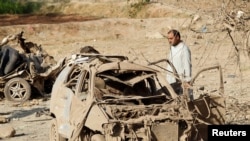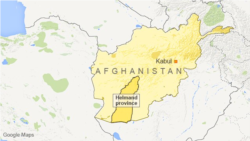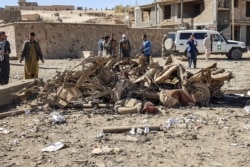The United States has warned that “distressingly” high levels of violence in Afghanistan threaten to derail Washington’s peace-building deal with Taliban insurgents and the ongoing intra-Afghan peace negotiations.
Zalmay Khalilzad, the U.S. special envoy to the turmoil-hit nation, issued the warning Monday as the Taliban intensified battlefield attacks against Afghan security forces, including large-scale offensives last week in the southern Helmand province.
“Our expectation has been and remains that violence comes down and stays down,” Khalilzad said in a series of tweets.
The violence was supposed to be “substantially’ reduced following the historic deal the U.S. signed with the Taliban in February to promote a negotiated end to the 19-year-old Afghan conflict, America’s longest.
On Sunday, the insurgent group said the U.S. military was violating the terms of the agreement. A U.S military spokesman swiftly rejected the accusations and blamed the Taliban instead for taking steps that were detrimental to the peace process.
Khalilzad also dismissed the insurgent accusations as unfounded and “inflammatory rhetoric,” saying they would not help advance the peace process. He stressed the need for strictly adhering to all articles of the U.S.-Taliban pact and Washington’s understanding with Kabul to gradually reduce Afghan hostilities.
“Continued high levels of violence can threaten the peace process and the agreement and the core understanding that there is no military solution,” Khalilzad said.
“The belief that says violence must escalate to win concessions at the negotiating table is very risky. Such an approach can undermine the peace process and repeats past miscalculations by Afghan leaders,” cautioned the U.S. envoy.
Khalilzad noted his delegation in recent meetings with the Taliban agreed to take measures toward decreasing violence and casualties in Afghanistan in line with the agreement. The deal has resulted in reduction in hostilities in Helmand, but violence overall in the country remains high, said the Afghan-born U.S. diplomat.
In its latest assessment, the United Nations noted that days of fighting in Helmand has caused the security situation in several locations to deteriorate, blocking access to the provincial capital, Lashkargah.
The U.N. humanitarian agency said the fighting had triggered the flight of residents, with local authorities initially estimating that 35,000 people fled to Lashkargah. It noted that U.N. assessment teams were still verifying these numbers.
On Sunday, a suicide car bombing in the central Afghan province of Ghor killed at least 15 people and wounded around 150 others. While no group has claimed responsibility, Afghan officials directly blamed the Taliban.
“Violence has stalked Afghans for far too long. It has robbed far too many Afghans of their loved ones,” Khalilzad said while responding to the Ghor attack.
The Taliban did not immediately respond to Khalilzad’s comments.
The insurgent group, while accusing the U.S. of violating the deal, warned that “all responsibility and consequences from continuation of such actions shall fall squarely on the shoulders of the American side.”
The U.S.-Taliban deal requires that all American and coalition forces leave Afghanistan by May 2021 in return for the insurgents cutting ties with terror groups, and reaching a political arrangement with rival Afghan groups to permanently end the conflict through ongoing talks with representatives of the Kabul government.
The intra-Afghan dialogue, which started more than a month ago in Qatar, has not achieved any significant breakthroughs because of disputes over procedural matters related to moving the process forward.








